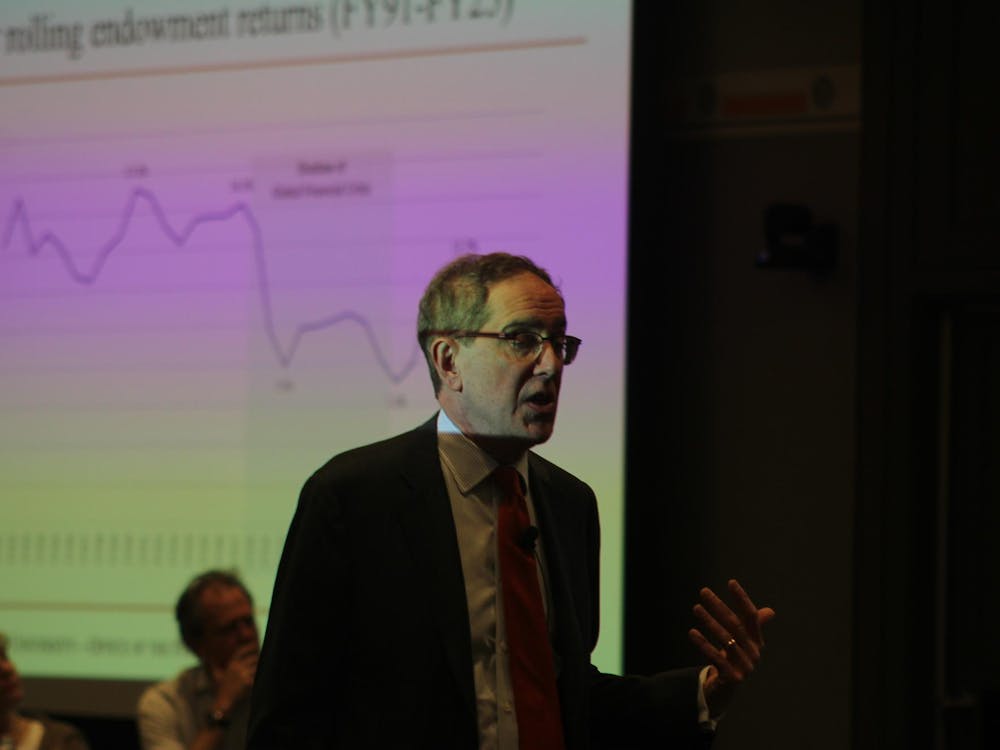The University is prepared to address two issues — the use of casual workers and wage levels — raised by the Workers' Rights Organizing Committee during the past few months, according to a statement released yesterday by Vice President for Finance and Administration Richard Spies GS '72.
"This is not specifically in response to the rally, but in response to the issues WROC raised," said University spokesperson Marilyn Marks. "These are important issues and they deserve attention."
The issue of casual workers — or temporary workers — was brought to light because the University hired more casual workers during the past few years following a decline in student employment on campus and the opening of the Frist Campus Center.
The proposed policy released yesterday will shift a "significant number" of casual workers to positions that use the regular salary scale and provide benefits such as health care coverage, disability coverage, unemployment insurance and life insurance.
Workers hired to work for at least a semester with a duty time of 50 percent or more should be hired either for specified terms or as regular employees on continuing appointment, according to the statement.
"This change in policy is a very good step and has been one of the issues WROC has underlined," said Julia Salzman '02, one of the WROC organizers.
David Tannenbaum '01, also a WROC organizer, said the report is a "victory for those who will receive the payments and benefits."
"We must keep in mind that this is relative. These changes will most likely affect 5 percent of the workers, so it's by no means comprehensive," he added.

USG president Joe Kochan '02, who was involved in the Alumni Day rally, echoed Salzman's sentiments.
"I believe that this announcement is a step in the right direction," Kochan said. "I think it signals a willingness among the University community members to seek out ways to collectively come up with solutions to the issues raised by WROC."
Though the policy would not eliminate the need for casual workers, it would decrease the number of such employees.
Richard Wilder, treasurer of Local 175 Service Employees International Union — representing janitorial and dining hall workers — said he "doesn't have a problem with there being casual workers, but there are workers who have been casual for years here."

Though most of these workers are in dining services, Wilder noted that there are workers in maintenance and other jobs who "have been here forever."
The next step for the University is to sit down and discuss the proposed policies with the local unions, said Vice President for Public Affairs Bob Durkee '69.
"It's not something the University can decide to do and do [by itself]," Durkee said.
Tom Parker, president of local 175 and an employee in mail services, said he was optimistic about the meetings.
"I'd like to say I'm optimistic, but it doesn't negate the fact that it could get to be a long, drawn-out process," he said.
In addition to the issue of casual workers, the University has called for a "thorough re-examination" of the compensation programs for its lower-paid workers.
"The focus is on the lower-paid workers," Durkee said, "but in the context of looking at the entire compensation program."
The University has asked the Priorities Committee — which usually studies the budget and makes recommendations on the size of each year's salary pool and its distribution — to conduct the review and has set a deadline for recommendations at the end of April.
"It would be good to see something implemented by the beginning of the next academic year," said Nick Guyatt GS, an organizer of WROC. "There are obviously going to be calculations about how to pay for any increase in wages — WROC understands that. But we hope that the administration will act expeditiously and won't stonewall on this issue or hide behind various committees."
In the statement, Spies maintained that the University has no plans to extend its current limited use of outsourcing of custodial services. Issues of shift differentials for unionized staffs will be dealt with in the collective bargaining process between the University and local unions.
"This is a big success for WROC," Guyatt said, "but it's only the first stage, we hope, in a broader [University] policy shift towards better treatment of low-wage staff."







